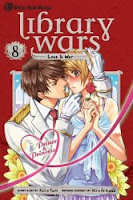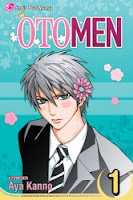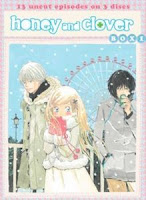My News and Reviews
I posted two reviews last week here at Experiments in Manga. First was for Strawberry Panic: The Complete Novel Collection written by Sakurako Kimino with illustrations by Namuchi Takumi. I was introduced to the Strawberry Panic yuri franchise through the manga, which was never completed. The novels are utterly ridiculous and yet highly entertaining. The other review was part of my Blade of the Immortal review project—Blade of the Immortal, Volume 13: Mirror of the Soul. I’m still loving the series. Mirror of the Soul focuses on Anotsu who I find to be an incredibly compelling character.
This week is the Shojo Beat Manga Moveable Feast, hosted by Manga Report! All of the quick takes below feature Shojo Beat manga and anime. On Wednesday, I’ll be posting an in-depth review of the first volume of the manga series Sand Chronicles by Hinako Ashihara. I think Sand Chronicles is one of the best contemporary shōjo manga series out there; it’s certainly one my favorites.
This past Friday, I had the opportunity to see Kataoka Ichiro, a professional benshi, in action. It was very cool. The University of Michigan’s Center for Japanese Studies hosts two film series every year. This fall, the series is focusing on the silent films by Ozu Yasujiro which are being shown accompanied by live music and benshi. With the exception of the opening night, the films and performances are free and open to the public. If you’re in Southeast Michigan on a Friday evening between September 14 and November 9, I highly recommend checking the series out. Can’t make it to the films? Kataoka’s interview on arwulf-arwulf’s “Face the Music” radio show is worth listening to, too.
I am absolutely thrilled with Nozomi Entertainment’s most recent license announcement—The Rose of Versailles. Hopefully, the acquisition of the anime series means that the manga may be within reach for English-reading audiences. The series is infamous for being unlicensable, but maybe there could now be a chance. Either way, I’m very happy that The Rose of Versailles anime will be available next year.
The Hooded Utilitarian, a cultural criticism blog that largely focuses on comics (including manga, from time to time), is celebrating it’s fifth anniversary with a roundtable called the Anniversary of Hate. So far, two of the posts have focused on manga: Jason Thompson’s From Habibi to Tezuka, With Ono In Between and Kate Dacey’s Peace and Hate. Some of the comments on these posts are also very intriguing and worth reading.
Quick Takes
 Dengeki Daisy, Volumes 5-8 by Kyousuke Motomi. I used to consider Dengeki Daisy a guilty pleasure of mine. Well, I’ve gotten over the guilt and now just enjoy myself. I find the series absolutely hilarious. Sure, it has it’s serious and melodramatic scenes, but it never fails to make me laugh. However, the eight volume has a drastically different tone (Motomi even admits as much). The volume delves into Kurosaki’s past and is understandably more somber, but it still contains moments of humor. Kurosaki’s guilt has been hinted at and its revelation has been built up to from the beginning of the series. Even though I wasn’t entirely convinced, for the most part I found myself satisfied with explanation.
Dengeki Daisy, Volumes 5-8 by Kyousuke Motomi. I used to consider Dengeki Daisy a guilty pleasure of mine. Well, I’ve gotten over the guilt and now just enjoy myself. I find the series absolutely hilarious. Sure, it has it’s serious and melodramatic scenes, but it never fails to make me laugh. However, the eight volume has a drastically different tone (Motomi even admits as much). The volume delves into Kurosaki’s past and is understandably more somber, but it still contains moments of humor. Kurosaki’s guilt has been hinted at and its revelation has been built up to from the beginning of the series. Even though I wasn’t entirely convinced, for the most part I found myself satisfied with explanation.
 Library Wars: Love & War, Volume 8 by Kiiro Yumi. Library Wars still isn’t as good as I want it to be, but I enjoy the manga enough to keep reading and I love the basic premise of the series. The resolution of book burning incident from previous volume is fairly anticlimactic, but as a result Iku finally realizes that Dojo is her prince. This gives Yumi plenty of opportunity to draw “jittery Iku” as Iku processes this development. The results are quite amusing. I’ve actually never been exceptionally fond of Iku as the main character (her incompetence as a librarian frustrates me), but she is growing on me and I appreciate her enthusiasm. Still, I tend to prefer almost any other character in Library Wars over Iku. I’m particularly fond of the romance developing between Tezuka and Shibasaki.
Library Wars: Love & War, Volume 8 by Kiiro Yumi. Library Wars still isn’t as good as I want it to be, but I enjoy the manga enough to keep reading and I love the basic premise of the series. The resolution of book burning incident from previous volume is fairly anticlimactic, but as a result Iku finally realizes that Dojo is her prince. This gives Yumi plenty of opportunity to draw “jittery Iku” as Iku processes this development. The results are quite amusing. I’ve actually never been exceptionally fond of Iku as the main character (her incompetence as a librarian frustrates me), but she is growing on me and I appreciate her enthusiasm. Still, I tend to prefer almost any other character in Library Wars over Iku. I’m particularly fond of the romance developing between Tezuka and Shibasaki.
 Otomen, Volumes 1-5 by Aya Kanno. Asuka Masamune is the epitome of manliness—strong, handsome, cool-headed, chivalrous. However, his hobbies, which he desperately tries to keep hidden, are less than manly. He loves cute things, sewing, cooking, and shōjo manga. Asuka is an otomen—a girly guy. Otomen relies heavily on gender expectations, stereotypes, shōjo tropes and cliches. Although the gender-bending nature of the characters and their interests are the source of the series’ humor, the manga doesn’t make fun of characters themselves. The series is lighthearted fun with the message that it’s okay to be who you are even when defies expectation. I am really enjoying Otomen and look forward to reading more.
Otomen, Volumes 1-5 by Aya Kanno. Asuka Masamune is the epitome of manliness—strong, handsome, cool-headed, chivalrous. However, his hobbies, which he desperately tries to keep hidden, are less than manly. He loves cute things, sewing, cooking, and shōjo manga. Asuka is an otomen—a girly guy. Otomen relies heavily on gender expectations, stereotypes, shōjo tropes and cliches. Although the gender-bending nature of the characters and their interests are the source of the series’ humor, the manga doesn’t make fun of characters themselves. The series is lighthearted fun with the message that it’s okay to be who you are even when defies expectation. I am really enjoying Otomen and look forward to reading more.
 Honey and Clover, Box Set 1 directed by Ken’ichi Kasai. I haven’t actually read the Honey and Clover manga, but I’ve heard great things about it and it’s anime adaptation. The series revolves around a group of friends who are students at an art college in Tokyo. We never really see their initial friendships develop, which makes me feel like I’m missing out on something. It is clear that their bonds are strong ones, though. Despite this, there is also a lot of loneliness in Honey and Clover. But there’s also plenty of humor, too, including the most epic game of Twister I’ve ever seen. While I’m not in a huge rush to finish the series, I did enjoy the time I spent with the characters of Honey and Clover. Their quirkiness is probably why I liked them so well.
Honey and Clover, Box Set 1 directed by Ken’ichi Kasai. I haven’t actually read the Honey and Clover manga, but I’ve heard great things about it and it’s anime adaptation. The series revolves around a group of friends who are students at an art college in Tokyo. We never really see their initial friendships develop, which makes me feel like I’m missing out on something. It is clear that their bonds are strong ones, though. Despite this, there is also a lot of loneliness in Honey and Clover. But there’s also plenty of humor, too, including the most epic game of Twister I’ve ever seen. While I’m not in a huge rush to finish the series, I did enjoy the time I spent with the characters of Honey and Clover. Their quirkiness is probably why I liked them so well.

I’ve been wanting to read Otomen! I think the concept sounds cute. :3
Asuka is so freaking adorable. I like that he can be tough when needed but also has a side to him that’s constantly blushing. Otomen can be rather silly, and the scenarios are ridiculous, but it’s a lot of fun. The characters aren’t particularly deep, but I like them.